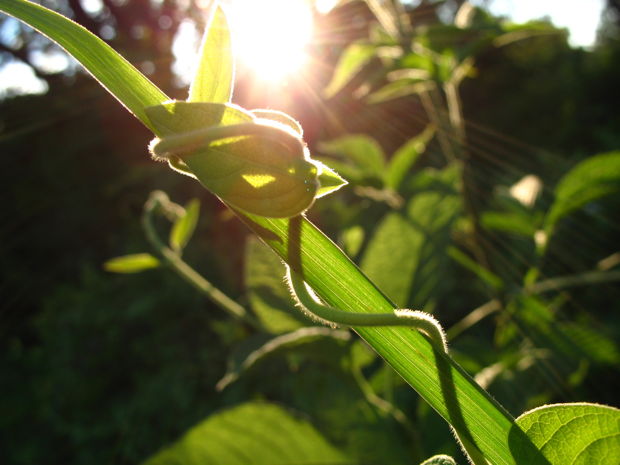Bent over in the backyard in my faded blue jeans with the too-long, fraying leg bottoms, I pull on a weedy vine. My soft old t-shirt is decorated with a border of Union Jacks framing Churchill’s bulldog stare and, under that, his signature “Never give in! Never give in! Never, Never, Never, Never.” I pull on the vine with all my might, not giving in, but even with the grip of my sturdy black garden gloves, it will not budge. It’s stuck to the ground as if with Super Glue.

I’d already removed the vine’s thinner end from several limbs of the dark green fir tree because it was shading their sunshine, suffocating them and turning them brown. I also removed a tenacious weedy vine from one of the apple trees my husband planted some years ago; a slow process of careful untangling, unwinding, and snipping left the hardy apple tree leaves and bark unharmed.
Working with weedy vines always makes me ponder the insidious, strangling deception that’s a part of our human world. It’s not all apple trees and sweet fruit.
And then there is the wild wisteria that sends shoots into the hedges in my backyard. To root them out, I have to be careful not to damage the hedge; they are both green and so leafy, it’s difficult to distinguish between them. This, I must admit, makes me consider people I’ve known who appear kind or charming until one spends private time with them, revealing that sometimes we humans are struggling with great demons of cruelty and denial. They walk among us, I sometimes think, the way weedy vines grow up among the hedges — it’s sometimes hard to tell who is genuinely kind and who is merely charming, or worse.
But as I clip the vine as low to the ground as I can, I hear Jesus telling one of his parables. The servants discover weeds growing among the wheat and ask the field’s owner, “Do you want us to go and pull them up?” And the owner says wisely,“No, because while you are pulling the weeds, you may uproot the wheat with them. Let both grow together until the harvest” (Matthew 13:28b-30a). This story reminds me that it is not my place to judge the lives of others, not even in my mind, so I pray for those who have hurt me.
And that leads me to examine my own self. I do this more often and more gently, too, now that I am friends with who I am, having learned through living and counseling and forgiving and being forgiven to love and honor the good in me and to love, accept, and deal prayerfully with my weaknesses. I was once very quick to judge others, until I realized how many deeply rooted weedy vines exist in my own life. 2 Corinthians 13:5 offers good advice: “Examine yourselves to see whether you are in the faith; test yourselves. Do you not realize that Christ Jesus is in you?”
I know that when I consider my own failings, I rarely do so without remembering the trauma and the internal battles that contributed to them, and that realization makes me consider that I would do well to attempt the same for others. When I look at my own life, I also remember how challenging it is to acknowledge the truth of my own demons and how it’s harder but best to invite them to Christ’s table within me, where he can show me how to extend grace to them. The Psalmist says, “You prepare a table before me in the presence of my enemies” (23), and we can take comfort in knowing that when those “enemies” are our shadow selves, God prepares a table — gives us nourishment, community, grace, and courage — even then, even there.
By the time I’d moved from weeding to raking leaves, I’d meditated on God’s grace, breathed in the rich fragrance of upturned dirt, and stretched muscles of body and soul. I was limber and ready for the scritch scritch scratching of raking, happy to be alive, feeling the sun on my shoulders and listening to the birds chirping their joy.
Simplicity tugs our hearts in the direction of love. Even simple words hide the transcendent. Take rake and leaf — lovely on the tongue after 1,000 years of humble, quotidian use, as comfortable and indispensable as a beloved old t-shirt. And the unexceptional act of raking that fall morning brought me joy and transformed an ordinary day into heaven, the yellow leaves in their drifting, gliding down moving me to consider how blessings tumble into my life from God’s creation and are beautiful, cherished, and transitory.
So I heap them up in my soul, scritch scritch, and gather them prayerfully to my heart, singing:
Glory be to the Father, and to the Son, and to the Holy Ghost;
As it was in the beginning, is now, and ever shall be, world without end. Amen.